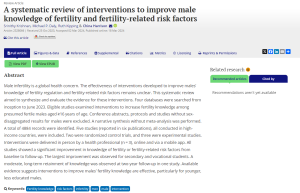Young men could benefit from being educated about fertility risk factors
18 March 2024
Younger, less educated men may benefit from interventions aimed at increasing what they know about their own fertility. A systematic review published in Human Fertility found that counselling, education and mobile apps can all have a positive effect on male fertility knowledge.
Male fertility problems are a global health concern and have been suggested to be associated with modifiable health behaviours such as smoking, alcohol, drug use and caffeine Male fertility has also been associated with cardiovascular disease, diabetes and other chronic conditions. This means that improving what men know about their own fertility, and what factors could put their fertility at risk, could also improve their general health and well-being, as well as their fertility.
Researchers at the University of Bristol identified five studies looking at interventions aimed at improving men’s knowledge about their fertility and fertility-related risk factors. They found that taking part in an intervention significantly improved what participants knew about fertility or fertility-related risk factors. However, the degree of improvement varied, and some interventions demonstrated greater improvements than others.
Secondary and vocational students gained the most knowledge, while people with higher levels of education benefitted less from the interventions. This suggests targeting younger, less educated men could be more impactful. Future research in this area should explore the impact of delivering interventions about fertility in educational settings as part of relationship and sex education, with pupils of different ages.
The studies included in this review looked at different intervention types:
- counselling delivered by nurse-midwives during sexual health visits
- information provided through a mobile health app
- an animated educational video delivered to medical students
- an educational class on human fertility delivered in a school
- an educational brochure on infertility facts and risks delivered online
Dr China Harrison, corresponding author, said:
“The positive impact of the different intervention types we identified suggests a broad range of interventions that could potentially be developed and implemented in clinical and/or educational settings. Integrating fertility education with a focus given to male as well as female fertility could contribute to enhanced reproductive health.
“Health care professionals could proactively incorporate fertility educational strategies in routine clinical consultations. This could lead to discussions with male patients and enhance their fertility awareness knowledge and health.
“However, it is important for us to acknowledge the limited research in this area and that the long-term sustainability of the knowledge gains demonstrated by the included studies remains uncertain.
“More research in this area, including longitudinal assessment of knowledge gain, is therefore critical.”
Paper
